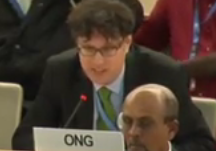
Mar 19, 2018 | Advocacy, Non-legal submissions
The ICJ spoke at the UN today on concerns about a resurgence of communal violence, and a failure to implement reconciliation and justice mechanisms, in Sri Lanka.
The statement, made during the adoption of the outcome of the Universal Periodic Review for Sri Lanka by the Human Rights Council, read as follows:
“The International Commission of Jurists (ICJ) welcomes the report of the Working Group on the Universal Periodic Review (UPR) on Sri Lanka.
Sri Lanka has stated that it maintains zero tolerance for hate speech and religious violence, and that the National Human Rights Action Plan 2017–2021 contains a firm commitment to enforce section 3(1) of the ICCPR Act. The ICJ further notes that a circular was issued requiring all police officers to take immediate action in this regard. Despite these commitments, recent events demonstrate renewed conflict owing to communal violence directed at the Muslim minority. A state of emergency was proclaimed on 6 March following inaction from law enforcement, and its inability to contain the violence, and emergency regulations were in operation until yesterday.
The ICJ urges the government to demonstrate through action, its willingness bring to account those who have incited communal violence, in line with the ICCPR Act and the commitments conveyed by His Excellency the Ambassador here today. Pervading impunity has emboldened perpetrators to incite violent hatred publicly. Justice must follow recent arrests, ensuring impartial and effective investigations and trials, in line with human rights.
The ICJ also notes the limited progress made on implementing HRC resolution 30/1. Of the reconciliation mechanisms promised, only the Office on Missing Persons is operational. There is little transparency with regards to the other proposed mechanisms (including the mechanism on accountability with involvement of international judges, prosecutors and investigators), or in relation to repeal and replacement of the Prevention of Terrorism Act. Any new counterterrorism law must comply with international human rights standards, and we welcome the Ambassador’s affirmation of the Government’s commitment to this today.
The ICJ urges Sri Lanka to accept and implement all relevant UPR recommendations without delay, before the opportunity for reform may be lost.”
Video of the ICJ statement is available here:
Video of the opening presentation by H.E. the Ambassador of Sri Lanka is available here:
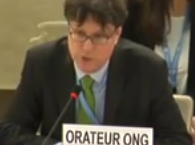
Mar 19, 2018 | Advocacy, Non-legal submissions
The ICJ today delivered an oral statement at the UN calling on Pakistan to amend or repeal blasphemy laws, end military trials of civilians, and take effective measures against impunity.
The statement was delivered during the adoption of the Universal Period Review Outcome for Pakistan, at the UN Human Rights Council. It read as follows:
“The International Commission of Jurists (ICJ) regrets that Pakistan has not supported recommendations related to amending its blasphemy laws, ensuring its counter-terrorism measures are compatible with human rights, and combatting impunity for serious human rights violations.
Pakistan’s blasphemy laws are frequently misused; blatantly discriminate against minority religions and sects; infringe upon the rights to freedom of expression and religion; and give rise to serious fair trial concerns. The Government has failed to amend them in accordance with its international law obligations.
In January 2015, Pakistan empowered military courts to try people accused of terrorism-related offences. The ICJ has documented serious fair trials violations in the operation of military courts including: denial of the right to counsel of choice; failure to disclose the charges against the accused; denial of a public hearing; and a very high number of convictions based on ‘confessions’ without adequate safeguards against torture and other ill-treatment.
The Government has also failed to take steps to combat impunity for serious human rights violations such as extrajudicial killings, enforced disappearances, and torture and other ill-treatment, which are facilitated by laws such as the Actions (in aid of civil power) Regulation and other national security legislation.
Despite repeated commitments to do so, Pakistan has also not enacted legislation to recognize torture or enforced disappearance as a distinct, autonomous offence in its penal code.
The ICJ therefore urges the Government to reconsider, accept and implement UPR recommendations to:
- Ensure that military courts have no jurisdiction over civilians, including for terrorism-related offences;
- Repeal or amend all blasphemy laws, in line with international standards; and
- Ensure all perpetrators of serious human rights violations – including enforced disappearance and extrajudicial killings –are brought to justice.”
Video of the ICJ statement is available here:
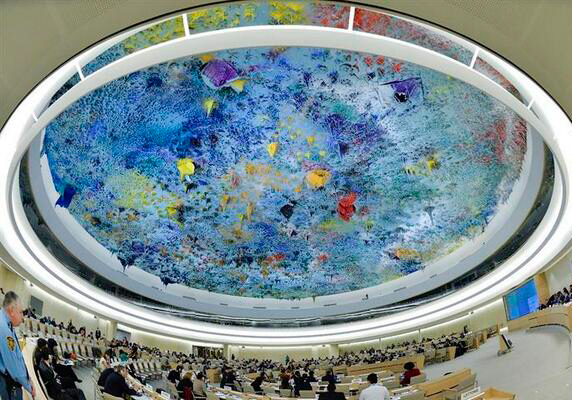
Mar 15, 2018 | Noticias
La CIJ preparó una declaración en las Naciones Unidas sobre la situación de los derechos humanos en Guatemala.
Debía hacerse durante la discusión en el Consejo de Derechos Humanos del resultado del Examen Periódico Universal para Guatemala, sin embargo, la Comisión Internacional de Juristas no pudo leer la declaración debido al tiempo limitado para las declaraciones de las ONG. La declaración contiene lo siguiente:
“Honorables miembros del Concejo de Derechos Humanos:
El Estado de Derecho en Guatemala está siendo socavado por las propias autoridades. Tal y como lo ha señalado la Comisión Internacional Contra la Impunidad de Guatemala (CICIG), el Estado se encuentra capturado por el crimen organizado. Desde que el Presidente de la Repuública Jimmy Morales declaró como “persona non grata” al Comisionado de la CICIG Abogado Iván Velásquez en agosto de 2017, los tres poderes del Estado de Guatemala tienen un objetivo comuún: recuperar el terreno perdido, por las acciones contundentes que la CICIG ha implementado contra la impunidad y la corrupción.
Preocupa sobre manera que el Organismo Legislativo esté tratando de aprobar una legislacion regresiva en materia de derechos humanos. En lo que respecta al Poder Judicial, la CICIG ha impulsado un proceso de depuración por la vía judicial y aquellos jueces que promueven más impunidad, se resisten a ser investigados protegiéndose en la figura del antejuicio.
En este contexto, se está llevando a cabo el proceso de elección del próximo Fiscal General. El Presidente de la República tendrá que elegir de una lista de seis candidatos. Urge que el Consejo de Derechos Humanos inste al Presidente de la República a elegir a una persona honesta y que esté comprometida con el respeto de los derechos humanos. La CIJ lamenta que algunos candidatos o candidatas participen para consolidar “el pacto de corruptos” en marcha.
Finalmente, es necesario que el Consejo de Derechos Humanos demande a los tres Poderes del Estado, apoyar decididamente los actos que el Comisionado Iván Velásquez lleva a cabo en Guatemala y el trabajo de las Instituciones Nacionales de Derechos Humanos, así como respetar y atender la gestión positiva que viene realizando el Procurador de los Derechos Humanos Abogado Jordán Rodas.”
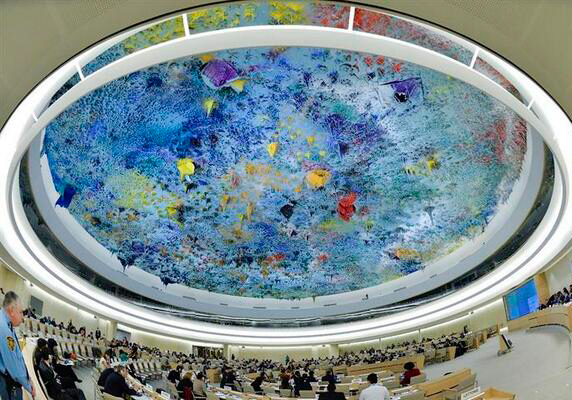
Mar 15, 2018 | Advocacy, Non-legal submissions
The ICJ today spoke at the United Nations on impunity and the situation for human rights in Peru.
The oral statement was made during the discussion at the Human Rights Council of the Universal Periodic Review outcome for Peru. It read as follows (translation from the original Spanish):
“Mr President,
The International Commission of Jurists (ICJ) recognizes the progress made by the Peruvian State in the field of human rights and its openness in relation to the recommendations made in the current cycle of the Universal Periodic Review.
The ICJ regrets, however, that the investigation and punishment of those responsible for the serious human rights violations that occurred during the internal armed conflict have not received the attention they deserve. On the contrary, the fight against impunity has receded with the granting of pardon and presidential grace to former president Alberto Fujimori who was serving a prison sentence for a series of crimes against humanity committed during his term. The presidential grace grants immunity from investigations and prosecutions in course or to be opened in the future.
One of the recommendations (111.97) that Peru accepts with qualifications refers to investigations and reparations to the thousands of women who suffered forced sterilization during the Fujimori administration. The measures of pardon and grace granted would exonerate Fujimori from investigation and punishment for this and other serious crimes. The ICJ urges the Peruvian State to implement the recommendations of the international community with full respect for international standards that prohibit impunity for serious violations of human rights.
Thank you Mr President.”
The ICJ oral statement complements a related written statement by the ICJ at the session.
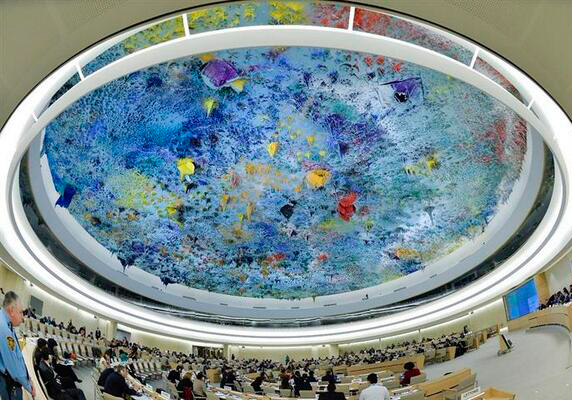
Mar 15, 2018 | Noticias
La CIJ habló hoy en las Naciones Unidas sobre la situación de los derechos humanos en Perú.
La declaración oral fue hecha durante la discusión en el Consejo de Derechos Humanos del resultado del Examen Periódico Universal para el Perú. Dice lo siguiente:
“Sr Presidente,
La Comisión Internacional de Juristas (CIJ) reconoce los avances logrados por el Estado Peruano en materia de derechos humanos y su apertura en relación a las recomendaciones formuladas en el presente ciclo del Examen Periódico Universal.
La CIJ lamenta sin embargo que la investigación y sanción a los responsables de las graves violaciones a los derechos humanos producidas durante el conflicto armado interno no hayan recibido la atención que merecen. Por el contrario, la lucha contra la impunidad ha retrocedido con el otorgamiento de indulto y gracia presidencial al ex – presidente Alberto Fujimori quien cumplía pena de cárcel por una serie de delitos de lesa humanidad cometidos durante su mandato. La gracia presidencial le otorga inmunidad en materia de investigaciones y procesos penales en curso o por abrirse en el futuro.
Una de las recomendaciones (111.97) que el Perú acepta con calificaciones se refiere a las investigaciones y reparaciones a las miles de mujeres que sufrieron esterilización forzada durante el gobierno de Fujimori. Las medidas de indulto y gracia otorgadas exonerarían a Fujimori de investigación y sanción por este y otros delitos graves. La CIJ exhorta al Estado Peruano a que ejecute las recomendaciones de la comunidad internacional con total respeto a los estándares internacionales que prohíben la impunidad por violaciones graves a los derechos humanos.
Gracias Sr Presidente.”









